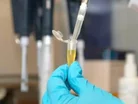Keep it clean: Drug testing in athletics

At the time of writing this, the IAAF (International Association of Athletics Federations) World Championships 2011 are in full swing in Daegu, South Korea. With thousands of athletes competing against each other to be the World Champion in their athletic specialties, they will have done all they can to ensure they perform at the top of their game.
Unfortunately, it has been known for the pressure and desire to add another medal to the shelf to become too much for some athletes, leading them to turn to performance enhancing drugs in their quest for glory.
It goes without saying that the taking of anything that can boost an athlete’s performance, not just in athletics but in any sport, is taken very seriously. Athletes are subjected to both random and scheduled blood testing and if an athlete tests positive for a banned substance, they face either a temporary or permanent ban from their sport or in some cases, a prison sentence.
This year’s World Championships were full of world firsts. Before the event began, the IAAF announced its zero-tolerance approach to drug cheats and for the first time in the history of the Championships samples from every accredited athlete were stringently collected and tested. In total the IAAF collected 1,848 blood samples, representing “a sample from each participating athlete at the World Championships.”
The move by the IAAF forms part of its efforts to introduce a ‘biological passport’ to athletics, similar to that used by cycling authorities around the world. The collection of such a large number of blood samples by the IAAF was in addition to the usual 500 urine tests carried out by the World Anti-Doping Agency (WADA) during the competition. The Federation said its focus on and intolerance against drug cheats forms “the core of the IAAF's development of an Athlete Biological Passport.”
Meanwhile, the President of the IAAF, Lamine Diack, said: “The IAAF is proud of its total commitment to the fight against doping in athletics and this initiative will stand us in very good stead as we re-double our efforts going forward.”
In another world’s first occurrence and perhaps, given the subject of this article, an ironic one, was ‘Blade Runner’ and South African Paralympian, Oscar Pistourius, competing against able-bodied athletes. After a landmark ruling in 2008 by the Court of Arbitration of Sport, Pistourius has been allowed run in the World Championships and Olympics, should he meet the qualification times. The decision permitting Pistourius’ involvement in the Championships is ironic because the decision has attracted huge amounts of criticism, with some saying his Össur Flex-Foot Cheetah blades gives him an unfair advantage against other athletes.
For now though, let’s go back to subject of drug testing. By the start of the World Championships on 27 August two athletes; Jamaican sprinter Steve Mullings and American sprinter Mike Rodgers were both disqualified from the competition after testing positive for masking agent Furosemide and banned stimulant methylhexaneamine respectively.
Although the WADA is on a mission to lead a “collaborative campaign for doping-free sport”, during this year’s championships some claimed that there are certain countries employing more stringent drug testing regulations than others.
According to British newspaper the Daily Mail, Travis Tygart, the Chief Executive of the US Anti-Doping Agency, voiced his opinion on the differing standards of drug testing procedures and programmes across the world. Tygart was quoted as saying: “There does currently exist a divide between a number of nations that are running the most effective programmes. You look at the UK, France, Norway and, hopefully, the US. They are in stark contrast to the quality of the programmes in Spain, Jamaica, Russia. That's troubling particularly because our athletes will be on the world stage competing against those athletes.
“Frankly, athletes from those countries [Jamaica, Spain and Russia] deserve to be able to say: ‘Hey, we're clean and not only are we clean but we're held to the highest standard.’ I feel bad for athletes from those countries, because they don't have the ability to say that.”
Meanwhile, commenting on the anti-doping policies used specifically in the UK athletics scene, British Olympic athlete Marilyn Okoro, told Healthcare Global: “We’ve got a very good system in place in the UK; you have to make yourself available for one hour every day where you can be randomly tested. They do have a system where they come out of hours, so it is completely random, they can come to your home or training venue. It is important to make sure that we are going to the Championships clean and we can hold out heads up high and say ‘we don’t cheat’. I think it’s a massive thing and I think a lot more countries could do with a system like ours.”
David Howman, WADA’s Director General on its network of accredited testing labs:
The WADA’s Doping Control Process for Athletes:
Our magazine is now available on the iPad. Click here to download it.



